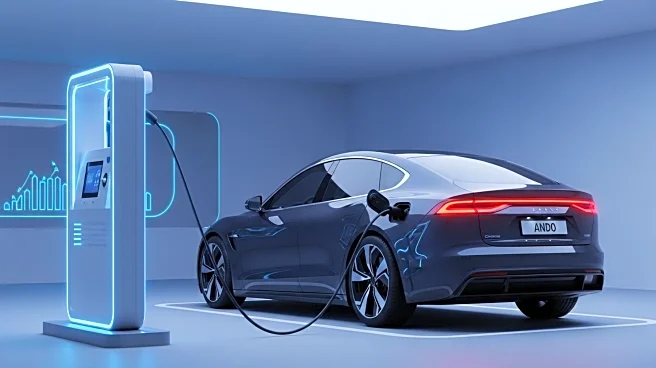What is the story about?
What's Happening?
The United Kingdom has witnessed a significant surge in electric car sales, reaching a record high in September. This increase is attributed to the reintroduction of government subsidies aimed at promoting electric vehicle (EV) adoption. The Society of Motor Manufacturers and Traders (SMMT) reported that battery electric vehicle sales rose by nearly a third compared to the previous year, totaling 72,800 units. The UK government reinstated the electric car grant in July following pressure from car manufacturers who were struggling to meet the zero emission vehicle (ZEV) mandate targets. The grant offers up to £3,750 for eligible vehicles, although it applies to only about a quarter of the battery cars available in the UK market due to specific emission rules and a price cap of £37,000. This initiative has also led to a 56% increase in plug-in hybrid sales, as manufacturers shift focus to more profitable models amid growing competition.
Why It's Important?
The reintroduction of electric car grants is a strategic move by the UK government to accelerate the transition to cleaner transportation and meet environmental targets. This policy not only supports the automotive industry by boosting sales but also aligns with broader climate goals. The increase in electric vehicle sales signifies a positive shift towards sustainable transportation, potentially reducing carbon emissions and reliance on fossil fuels. However, the policy's limitations, such as the exclusion of certain brands and a cap on vehicle prices, highlight ongoing challenges in achieving comprehensive market penetration. The success of this initiative could influence similar policies in other countries, impacting global automotive markets and environmental strategies.
What's Next?
As the UK continues to push for higher electric vehicle adoption, the government may need to reassess the grant's structure and eligibility criteria to ensure broader market coverage and sustained growth. The current scheme is set to benefit only the first 400,000 buyers, suggesting a potential need for extension or modification to maintain momentum. Additionally, the automotive industry and policymakers will likely monitor the impact of these grants on meeting the ZEV mandate targets and overall carbon emission reductions. Future adjustments to the policy could address the balance between supporting domestic manufacturers and encouraging international competition.
Beyond the Headlines
The electric car grant reintroduction raises questions about the long-term sustainability of government subsidies in driving market change. While effective in the short term, reliance on financial incentives may not be sustainable without parallel advancements in infrastructure, such as charging networks, and consumer education. The policy also underscores the tension between environmental goals and economic realities, as manufacturers navigate regulatory requirements and market demands. The UK's approach could serve as a case study for balancing these factors in the pursuit of a greener economy.

















